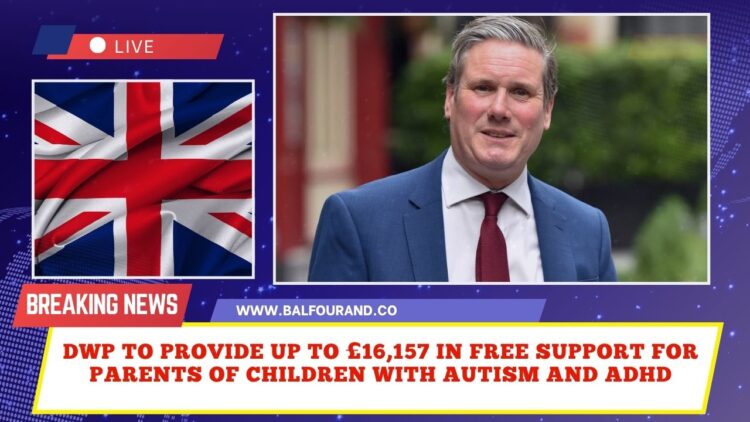Families in the UK raising children with autism or ADHD may be eligible to receive up to £16,157 in government support. This financial assistance is designed to help manage the additional costs associated with raising neurodivergent children.
A range of six payments and allowances—from disability benefits to childcare support—are available for eligible households. Here’s everything you need to know about the value, eligibility, and application process for these benefits.
Understanding Autism and ADHD
What is ADHD?
Attention Deficit Hyperactivity Disorder (ADHD) is a neurodevelopmental condition characterized by symptoms such as inattention, impulsivity, and hyperactivity.
These symptoms can significantly impact a child’s daily life and development. According to a UK-based survey of 10,438 children aged 5–15, 3.62% of boys and 0.85% of girls were identified with ADHD.
What is Autism?
Autism Spectrum Disorder (ASD) affects how individuals interact, communicate, and process information. Children with autism may struggle to understand other people’s emotions, find social situations overwhelming, or be particularly sensitive to lights, sounds, or routines. The NHS notes that repetitive behaviors and sensory sensitivities are also common.
Breakdown of Benefits Worth Up to £16,157
The six key financial aids available to eligible parents include:
| Benefit | Amount | Eligibility Criteria |
|---|---|---|
| Disability Living Allowance (DLA) | Up to £9,700 | For children who need care, supervision, or have limited mobility due to a health condition |
| Carer’s Allowance | £4,331 | For caregivers providing 35+ hours/week of care to a child with disability |
| Tax-Free Childcare | £2,000 | For working parents with children under 12 (or under 17 if disabled) |
| Disabled Persons Railcard | £126 (average annual saving) | Offers 1/3 off rail fares for cardholders and one companion |
| Family Fund Grant | Variable | Grant based on family income and impact of the child’s disability |
| Local Grants | Varies | Available through local councils and charities, assessed via tools like Turn2Us |
1. Disability Living Allowance (DLA) – Up to £9,700
The DLA is divided into two components: Care and Mobility. Eligibility depends on how the disability affects your child’s everyday activities. You might qualify if your child:
- Needs help with basic tasks like eating, dressing, or communicating
- Requires constant supervision to ensure safety
- Can’t prepare a hot meal independently
- Needs someone with them during medical treatments like dialysis
Even if no one is currently providing the care, or if you live alone, you can still qualify based on the child’s needs.
2. Carer’s Allowance – £4,331 Per Year
Parents or guardians who provide care for 35 hours or more per week can claim £83.30 per week. This is not affected by whether you live with the person or are related to them.
However, only one carer per child may claim this allowance. You can choose weekly or monthly payments, depending on preference.
3. Tax-Free Childcare – Up to £2,000 Per Child
Eligible families can receive up to £2,000 annually per child to help with childcare expenses. If the child is disabled, this amount increases to £4,000. The scheme is open to working parents across the UK, including England, Scotland, Wales, and Northern Ireland.
To qualify
- Both parents (if applicable) must be working
- You must not be receiving Universal Credit
- Individual earnings should be at least £2,539 per quarter
- Recently self-employed individuals may benefit from lenient income criteria
4. Disabled Persons Railcard – Save Around £126 Per Year
This card provides a 33% discount on rail travel across Britain and can also be used by a companion travelling with the child. Although the card itself doesn’t reduce child fares, it offers significant annual savings and only costs £14.50 for children aged 5–15.
5. Family Fund Grant – Amount Varies
Family Fund provides grants to low-income families raising disabled children. These grants can cover items such as specialist equipment, holidays, or household appliances.
How to Apply
- Applications are made online
- Decisions are quicker when submitted electronically
- Availability depends on funding status in your region
- Note: Applications are currently closed in Wales
6. Local Grants and Charitable Support
Additional local government and charity grants may be available for families in need. These do not require repayment and are based on financial need. Tools like Turn2Us’ grant checker help you determine eligibility for over 1,400 support programs across the UK.
Raising a child with autism or ADHD presents emotional and financial challenges, but there is significant support available. From Disability Living Allowance to Tax-Free Childcare, parents can access a combination of benefits totaling up to £16,157 annually.
These payments are designed to ease the burden and ensure children with additional needs receive the care and opportunities they deserve. Understanding what’s available and applying promptly can provide vital relief and support for families across the UK.
FAQs
Can I claim both DLA and Carer’s Allowance at the same time?
Yes, if your child qualifies for DLA and you provide 35+ hours of care per week, you can also claim Carer’s Allowance.
Is Tax-Free Childcare better than Universal Credit?
It depends on your financial situation. Most families on Universal Credit will benefit more from the childcare element of UC than Tax-Free Childcare.
Are local grants available everywhere in the UK?
Local grants vary by region and funding availability. Use tools like Turn2Us to check eligibility in your specific area.
